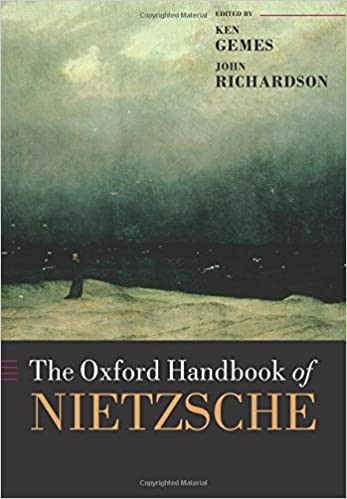Problems With Truth

By Ken Gemes

Nietzsche was the first philosopher to seriously question the value of truth, a value that previous philosophers, and nearly all subsequent philosophers, have treated as absolutely sacrosanct, as something beyond question. There are in fact good arguments for the claims : one, that we need at least a minimum of true belief; and two, that we need at least a minimum of speaking the truth. Regarding the need for a minimum of true belief: If one has false beliefs , say, about what is poisonous to eat and what is healthy to eat, one is likely to die soon. Regarding the need for a minimum of speaking the truth: If parents spoke largely falsely to their infant children in their usage of basic language – if parents were to say, for instance, “That’s red” when pointing to objects of all different colours, then their children would not experience the kind of uniformity of usage that is needed to acquire language.
But if some truth-believing and truth-speaking is needed to survive and to share a common language, then that still leaves open the question of how much truth do we need. Philosophers are inclined to answer that we should always strive for the truth; it’s good to have as much truth as possible. Of course not all truths are equally valuable. Thus philosophers allow that the mere collection of random truths, irrespective of the value of those truths, may not be desirable. Philosophers will allow that there are some cases where believing something false has benefits. For instance, it often helps athletes’ performance to overrate their abilities. Basketball players who believe they will make every shot at the free-throw line tend to do better than those who focus on their actual percentage of making such shots. Soldiers who find themselves behind enemy lines have a greater chance of making it back to their own troops if they believe they are somehow special and are going to succeed, even though the vast majority of such soldiers get caught by the enemy, irrespective of what they believe. But these seem exceptional cases. In such cases one has prudential reasons rather than evidential reasons for having these false beliefs. Prudential reasons have to do with what is in one’s best interests, whereas evidential reasons have to do with what the evidence actually supports.
Arguably, normally one’s survival and success does not require havingfalse beliefs. Normally it is in fact prudential to have true beliefs. False beliefs, for instance, that nightshade berries are not poisonous, can have bad, even fatal, consequences. It is this fact that argues for an evolutionary advantage in having what Nietzsche calls a will to truth. Those who had no care at all for truth would have had very poor prospects of reaching an age where they had opportunities for reproduction.But could there be a deep human need that clashes with our will to truth? Nietzsche argued that there is such a need, namely, our need to find existence meaningful. The clash between our will to truth and our need for existential meaning is for Nietzsche the great problem of modernity. As that will to truth becomes stronger and stronger it clashes with and eventually destroys all those narratives that give life existential meaning. The greatest casualties of that will to truth are life-sustaining religious narratives. Nietzsche claimed that such narratives held off suicidal nihilism for millennia. Belief in a caring God who rewards good behaviour and punishes bad behaviour, and who promises eternal bliss to the faithful, gave existence meaning.
Belief in God motivated consideration of, and compassion for, our fellow humans. For a short time after what Nietzsche calls “the death of God” a secular version of this Judeo-Christian providential narrative was successful. The secular Enlightenment world view which flourished from around the 17th to the 20th century instituted the will to truth as the centre of human existence. According to the Enlightenment narrative the pursuit of truth and knowledge would yield freedom: freedom from ignorance; freedom from oppression; and, via science and technology, freedom from material need. Despite giving up on the metaphysics of Christianity – that is, belief in God, belief in divine creation, belief in immortal souls – this humanistic Enlightenment philosophy basically kept the moral core of Judeo-Christian morality, namely, compassion towards one’s fellow humans. Indeed Nietzsche argued that the Enlightenment idea that the truth will set one free is itself a value inherited from the Judeo-Christian tradition. Nietzsche argued that it is the very Judeo-Christian enshrinement of the value of truth that eventually leads to the destruction of belief in God; poetically commenting that “all great things perish through themselves.”
Careful readers will note that above I have given two different accounts of the genesis of our will to truth. One simply involves the evolutionary fact that an interest in truth will, by and large, be conducive to survival. Note, this gives us an account of why we value truth. It does not say that we are right or wrong to do so. The other account focused not on facts of evolution but on religious authority enshrining truth as a sacrosanct goal. It is the religious account that explains how truth became an explicit overriding moral imperative. The evolutionary account explains why we tend to have some care for truth, but it gives no account of why we should prefer truth at all costs. According to Nietzsche this belief in the overriding value of truth is the last remnant of the Judaeo-Christian tradition. Nietzsche predicted that, when that tradition’s influence wanes, we will come to question the sanctity of the value of truth: “in the end it [Christian truthfulness] draws its strongest conclusion, its conclusion against itself ... it poses the question, ‘what does all will to truth mean?" Nietzsche predicted correctly that we will come to question the value of truth, an experience that is now common in a so-called post-truth society. But he also showed that we have actually all too human reasons for doubting the value of truth; namely our need for narratives that imbue existence with meaning. It seems the price for clinging to the overriding value of truth, to truth at any cost, is to live in a disenchanted world void of meaning. There are of course many who still cling to the Enlightenment narrative which gives truth an overriding value. Often they do so in a rather moralistic way, addressing those who are more focused on creating alternative narratives of meaning in a deeply condescending manner. What these truth lovers do not realize is that this valuing of truth that they take to be a fundamental moral percept is also an expression of their will to power. Consider: who are these people who press the need to evaluate evidence carefully, to care for truth, to take instruction from the scientists? Usually they are members of an educated elite who themselves have special skills in evaluating evidence and in seeking the truth. In effect they are telling everyone that they should value this elite and strive as much as it is in their power to be like them.
I say all this as a member of that elite and as one who takes truth and responsiveness to evidence to be highly valuable, even if I do not share the idea that everyone should always take truth to override all other values. I aim to be faithful to Nietzsche’s call to answer the question “What in us values truth?” that requires that we realize that some have abandoned the notion of the overriding value of truth, because it is the only way for them to construct narratives that relocate meaning in existence. Furthermore, we need to recognize that the educated elite cling to the overriding value of truth partly because it promotes a world in which they are seen as exemplary. Saying that truth is of overriding value is a way of saying we, the educated elite, are of overriding value. Instead of looking with moral indignation and abhorrence at those who are not served by the call to make truth sacrosanct, at those who are less capable in evaluating evidence and finding truth, we should recognize that this call to truth serves certain interests of the elite. We should admit that it can be inimical to the interests of others, especially through its tendency to destroy traditional meaning-conferring narratives. It is true that for a long time the pursuit of truth facilitated the making of discoveries, advances in technology and medicine, for instance, the discovery of drugs such as penicillin, which led to general advantage. But now the aggrandizing of the pursuit of truth at any cost can seem to serve certain elites more than the general good.
Now it seems more and more that the educated elite profit by this extreme valuing of the truth; the rest, not so much. The Enlightenment narrative that the truth will set you free, along with its associated narrative of the value of a meritocracy - both narratives that favour and empower the educated elite – have provided meaning to some while casting many others adrift. While the educated humanist elite gain a positive identity through their self-appointed mission of beneficence towards the less educated masses, those masses are cast as mere passive recipients of this largesse. The elite’s efforts may perhaps bring material benefits to those masses but at the expense of eviscerating their lives of any positive meaning. Little wonder that the nationalist irredentist narratives provided by demagogues such as Trump and Johnston, which claim to empower the ordinary citizen to fight for and regain alleged lost rights, are so popular. If the elite wish to understand the rise of these demagogues they would do well to heed Nietzsche’s observation that humans are motivated more by the problem of finding meaning than by the problem of avoiding suffering. Instead of condescension to those less able to evaluate evidence and find the truth it would be more productive to investigate ways of making others have more of an interest in pursuing truth. Some readers will take all this to be naive in that it does not addressed those who claim to believe that there is no such thing as truth or that all truth is relative. These views are in fact basically incoherent. The incoherence of the no truth position is revealed by the simple question “Is it true that there are no truths?” Those who peddle the relative truth claim should consider the question “Is it an absolute truth that all truth is relative?” and its ramifications. Even more to the present point, these positions themselves are typically only held by a certain subset of the educated elite who have found a particularly pernicious way of promoting their own interests within that elite. The unpleasant and usually pointless task of addressing them is best left to another day.
Thanks to Andrew Huddleston, Hallvard Lillehammer and Nicholas Joll for feedback on earlier versions.

About the Author
Ken Gemes is Professor of Philosophy at Birkbeck College, University of London. He has published extensively on Nietzsche and topics in logic and the philosophy of science.
He is the editor of:

The Oxford Handbook of Nietzsche

Nietzsche on Freedom and Autonomy
His 3:16 interview is here.